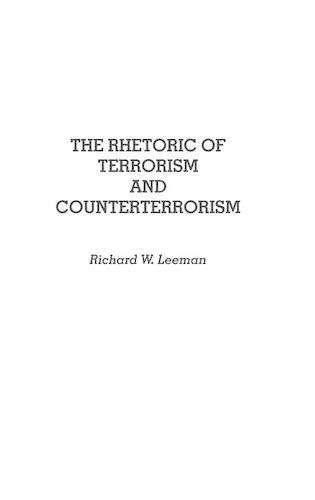
The Rhetoric of Terrorism and Counterterrorism
(Hardback)
Publishing Details
The Rhetoric of Terrorism and Counterterrorism
By (Author) Richard Leeman
Bloomsbury Publishing PLC
Praeger Publishers Inc
21st January 1991
United States
Classifications
Tertiary Education
Non Fiction
Communication studies
363.32
Physical Properties
Hardback
232
Width 156mm, Height 235mm
595g
Description
Richard Leeman analyzes the possible discursive responses to terrorism, prescribing "democratic rhetoric" as the most strategic counterterrorist response available. He examines counterterrorism as a response to terrorism, considering each side as one-half of a dialogue. As a test of his hypothesis, the author considers the responses of the Reagan and Nixon administrations to acts of terrorism. The Reagan administration's response to international terrorism provides an example of wholly non-democratic counterterrorist discourse. Leeman's case study suggests that this was a failed rhetoric. The Nixon administration, on the other hand, used a mixed democratic and non-democratic terrorist rhetoric in response to terrorism. Leeman argues that the non-democratic elements of the discourse subverted the democratic elements, thus leading to an ineffective use of discourse for the purpose of counterterrorism. Leeman thus concludes that a wholly democratic rhetoric is the best discourse available for the counterterrorist speaker or writer.
Reviews
Recommended for undergraduate and graduate libraries.-Choice
"Recommended for undergraduate and graduate libraries."-Choice
Author Bio
RICHARD W. LEEMAN is an Assistant Professor of English and a member of the Communication Studies Program at the University of North Carolina at Charlotte. He is the editor of Carolinas Speech Communication Annual and a contributing editor to Morality and Conviction in American Politics. He has contributed essays to American Orators of the Twentieth Century (Greenwood Press, 1987) and Multidimensional Terrorism.
